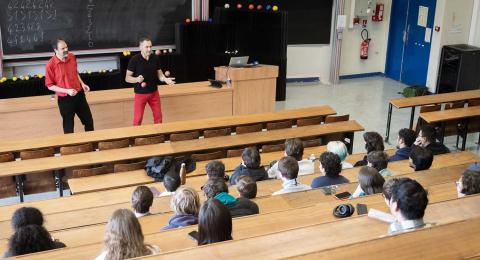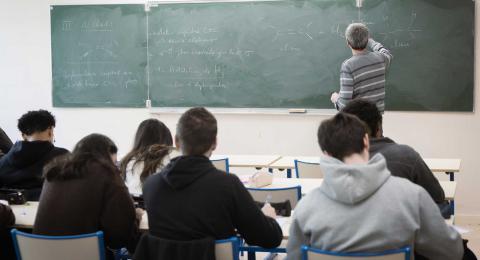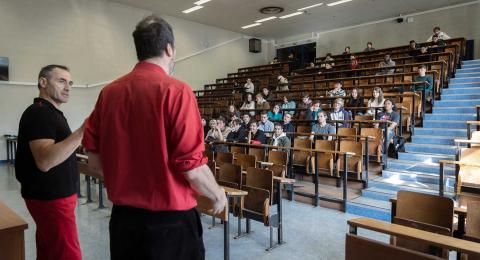The M2 DiPaC master’s program focuses on advanced topics in high-performance computing (HPC) and distributed computing on large-scale systems. Students learn to design fast, scalable, and robust solutions that address the heavy computational demands of applications in artificial intelligence (AI), big data analytics, and scientific and quantum computing. The program prepares graduates for careers in engineering and Ramp;D, or doctoral studies in parallel and distributed computing.
The curriculum includes seven core disciplinary courses in high performance, parallel, and distributed computing. In addition, students choose two elective courses to further specialize either in high performance data analysis and AI (HPDA) or in hybrid high performance/quantum computing (HQI). In addition, one soft-skill course from the university catalog reinforces transferable professional skills that support their long-term career development. A mandatory 6 month internship on M2 DiPaC-related themes completes the program.
The program’s official language is English; all courses take place and course materials are provided in English. Most of our faculty are also fluent in French; hence interaction in French is possible in the courses and assignments (homework, exams, etc.) if needed.
The program is closely integrated within the Paris-Saclay ecosystem of research laboratories and industrial partners.
Information
Skills
M2 DiPaC students will gain competency and skills in:
- Parallel programming models and performance engineering on CPUs/GPUs and distributed clusters/supercomputers.
- Design and analysis of distributed algorithms with theoretical guarantees.
- Scalable data analysis and AI skills: training, inference, large-scale distributed data analytics.
- Hybrid HPC+quantum simulation through exact and approximation techniques.
- Scheduling and load balancing of parallel workloads on clusters and clouds.
- Code profiling, tracing, bottleneck diagnosis, performance tuning techniques.
- Software engineering for HPC: modern C++, testing, CI, reproducibility.
- Version control with Git and rigorous documentation.
- Technical communication and project scoping in research and industry contexts.
- Responsible, reliable, and sustainable computing practices.
Objectives
Computer systems are evolving toward higher efficiency and richer functionality across three major, interconnected scientific fields:
- Distributed systems deliver connectivity and dependable operation across the Internet, clouds, clusters, and sensors, addressing hard problems in synchronization, security, concurrency, and robustness.
- High-performance and parallel computing (HPC) tackles intensive workloads in science and AI by exploiting supercomputing architectures and rigorous performance engineering.
- Quantum computing provides algorithms and hardware that exploit quantum parallelism to achieve gains unreachable by classical paradigms.
Building on the foundations that M1 DiPaQ establishes in HPC, distributed systems, and quantum computing, M2 DiPaC specializes on advanced topics in HPC and distributed algorithms for large-scale systems. Students learn to design fast, scalable, and robust solutions for applications in AI, big data analytics, scientific simulations, and quantum-enabled workflows. Students have the opportunity to specialize either in high performance data analysis (HPDA) or hybrid HPC/quantum computing (HQI) through elective courses.
Knowledge objectives:
- Parallel programming models and performance engineering on modern supercomputers and accelerators.
- Large-scale distributed algorithms and systems: replication, consensus, consistency, mobile agents, and nature-inspired algorithms with robustness and performance guarantees.
- Big data analysis, machine learning, and AI algorithms with massive computational challenges (HPDA)
- Quantum algorithms and simulation using both classical/HPC or quantum workflows (HQI)
Skill objectives:
- Building high-quality parallel and distributed algorithms and software that meet latency, throughput, and performance targets on target HPC architectures.
- Developing and analyzing scalable, robust algorithms with theoretical guarantees on scalability, consensus, termination, and fault tolerance.
- Optimizing HPC code across the stack: complexity, memory locality, vectorization, accelerator use, communication, I/O, and networks.
Resources and practice:
- Access to university clusters and partner supercomputers for hands-on labs, course projects, code development, and tuning.
- Use of open-source toolchains and libraries widely adopted by the HPC community.
- Acquiring modern HPC software engineering practices with advanced C++, IDEs, version control (git), documentation, and continuous integration.
Career Opportunities
Career prospects
After Master and PhD : reseacher or assistant professor or professor
Après Master + Doctorat : chercheur ou enseignant-chercheur
data scientist
enseignant.e-chercheur.se (après un doctorat)
Ingénieur de recherche
ingénieur développement
ingénieur maintenance
Ingenieur R&D
ingénieur support technique
Sous réserve de réussite au concours de la fonction publique, les diplômés pourront accéder à des postes d'ingénieur d’étude ou chercheur au sein d’un organisme national de recherche
Further Study Opportunities
Data Scientist, Data Analyst, Ingénieur·e en Machine Learning dans des secteurs innovants (tech, finance, santé, énergie, etc.) ;
ngénierie études, recherche et développement
PhD
Fees and scholarships
The amounts may vary depending on the programme and your personal circumstances.
Admission Route
Capacity
Available Places
Target Audience and Entry Requirements
- Audience. M2 DiPaC is the natural continuation of M1 DiPaQ for students aiming to specialize in advanced high-performance, parallel, and distributed computing.
- Prerequisites. Strong computer science background with basics in parallel programming and distributed systems. Solid mathematics (especially linear algebra) and programming skills are expected.
- Admissions from other related tracks. Outstanding students from related master tracks can be admitted if they already have some fundamentals in parallel or distributed computing. If needed, they will be allowed to take selected M1 DiPaQ courses as electives to close gaps.
- Double-degree pathway. We routinely admit exceptional engineering students finishing their fourth year (M1 equivalent) at nearby Paris-Saclay schools (CentraleSupélec, Polytech Paris-Saclay, ENSTA Paris, ...) as double-degree students, who desire to complete their fifth year at the engineering school in parallel with M2 DiPaC. A dedicated arrangement between two programs allows to study in both, with possible course waivers subject to approval by the master’s coordinators on each side. If you plan to apply, please contact the M2 DiPaC coordinator and your academic coordinator at the engineering school in advance.
- Positioning with respect to M2 QMI. While M2 DiPaC offers some optional quantum computing courses aligned with classical/HPC workflows, applicants seeking an exclusive focus on advanced quantum information science are encouraged to apply to our partner program M2 QMI.
A limited number of scholarships (Eiffel, IDEX, Quantum Saclay) are available for exceptional candidates.
Application Period(s)
From 15/04/2026 to 30/05/2026
Supporting documents
Compulsory supporting documents
Motivation letter.
All transcripts of the years / semesters validated since the high school diploma at the date of application.
Curriculum Vitae.
Additional supporting documents
Copy diplomas.
Letter of recommendation or internship evaluation.
Document at your convenience.
VAP file (obligatory for all persons requesting a valuation of the assets to enter the diploma).
Supporting documents :
- Residence permit stating the country of residence of the first country
- Or receipt of request stating the country of first asylum
- Or document from the UNHCR granting refugee status
- Or receipt of refugee status request delivered in France
- Or residence permit stating the refugee status delivered in France
- Or document stating subsidiary protection in France or abroad
- Or document stating temporary protection in France or abroad.
Teaching Location(s)
Academic partner
École Polytechnique
Télécom Paris
INRIA
Sorbonne Université
Université de Paris
Technion - Israel Institute of Technology
University of Tennessee
Old Dominion University
École Polytechnique Fédérale de Lausanne
Lisbon University
Karlsruhe Institute of Technology
University of Vienna









